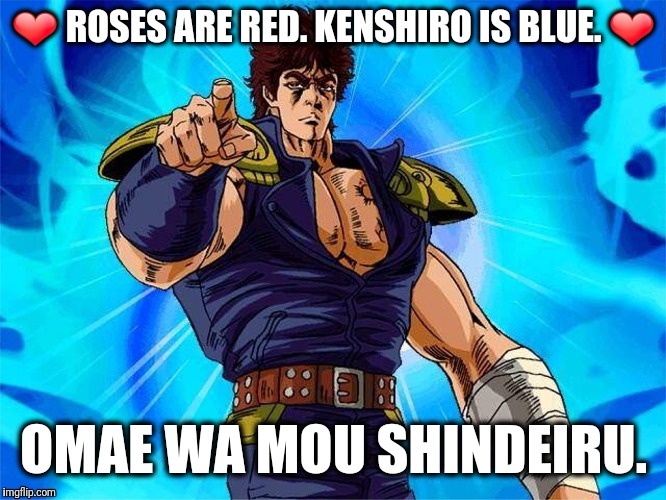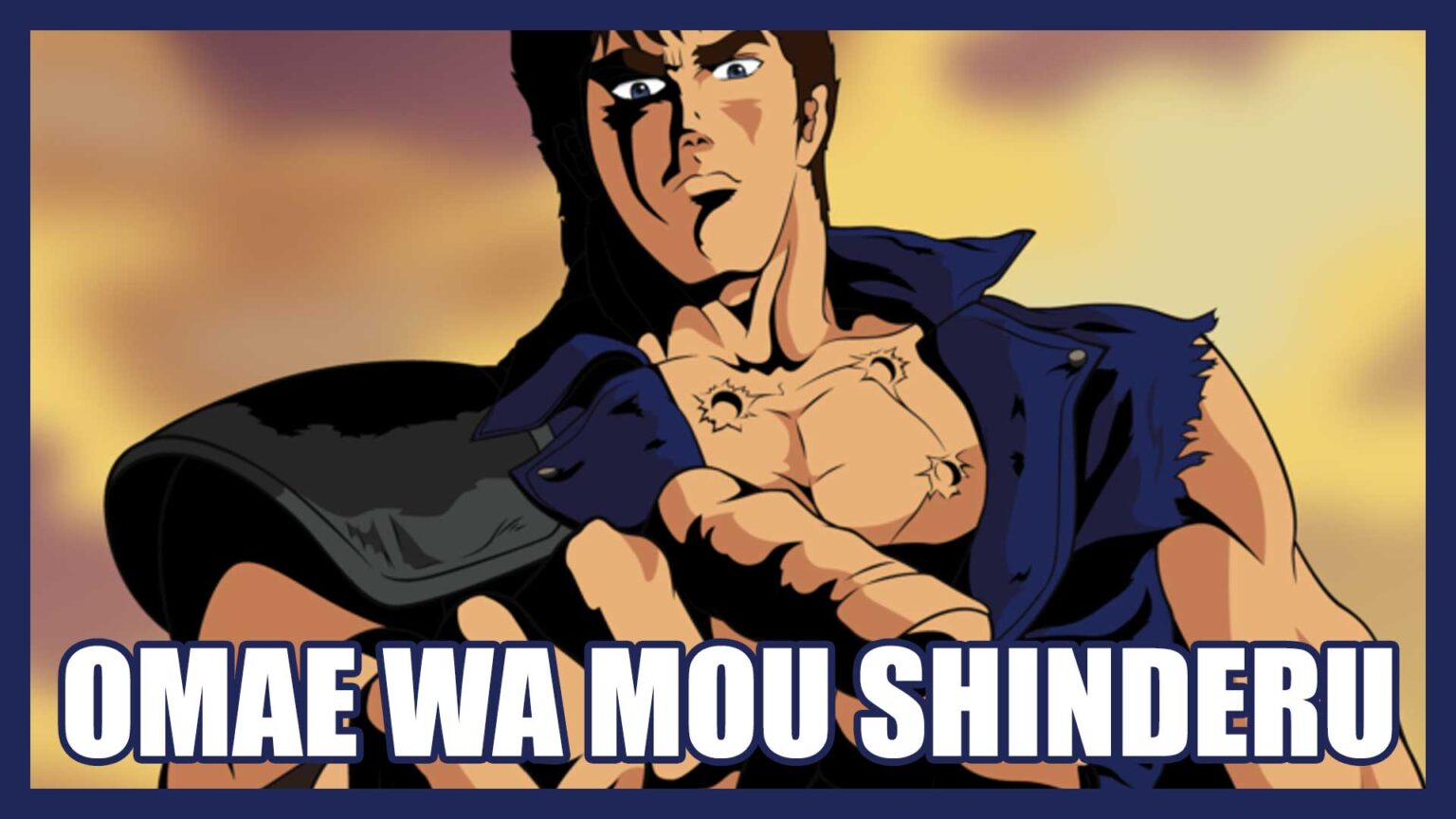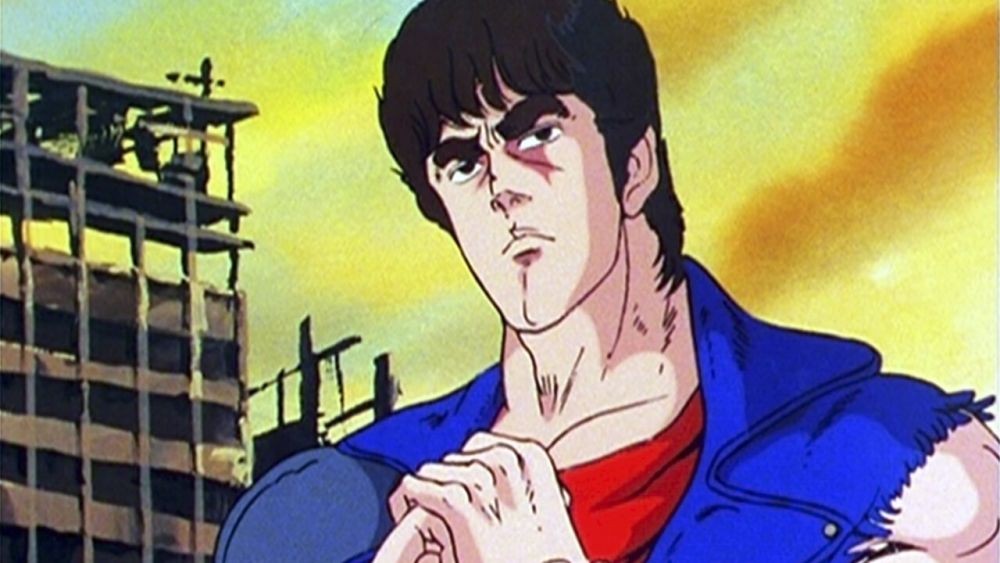
arti dari omae wa mou shindeiru nani Stewart Fisher
The state of being married. 死 し んでいる means someone or something died and, unless we are in a zombie apocalypse, that state hasn't changed. He/it is still dead -- not dead ing. The state of being dead. So, to wrap things up, the meme お 前 まえ もう 死 し んでいる!. should be translated "You are already dead!"

arti omae wa mou shindeiru nani Bella Hunter
What does "Omae wa mou shindeiru." mean? The Japanese phrase "Omae wa mou shindeiru" translates to "You are already dead.". Similarly to "Hasta la Vista" from the 1991 American movie "Terminator 2: Judgment Day," it conveys a sense of finality or dismissal. The word "Omae" is the male form of "you" in Japanese, and.
arti omae wa mou shindeiru nani Bella Hunter
Omae-san is the phrase for you (still, use it sparingly). You may also read or hear the expression omae-sama. Sama is similar to san in that it's an honorific that goes on the end of a name or pronoun to elevate the respect shown by the speaker to that person. Sama is a step above san. That said, my research shows that omae-sama isn't used.

apa arti dari omae wa mou shindeiru Dylan Pullman
Arti Omae Wa dalam Konteks Percakapan Sehari-hari. Saat ini, ommae wa menjadi salah satu kalimat yang cukup populer di kalangan anak muda, terutama di kalangan pecinta anime dan manga. Secara harfiah, ommae wa artinya "kamu adalah". Namun, arti sebenarnya dari kalimat ini tergantung pada konteks percakapan.

Arti Omae Wa Mou Shindeiru Nani Although the guy who invented it is so far unknown (we're
Pada meme 'Omae wa mou shindeiru' berbentuk video yang telah di-remix, suara yang digunakan pada meme tersebut adalah suara asli dari karakter Kenshiro. Suara Kenshiro sendiri diisi oleh seorang seiyuu senior kelahiran 1946 asal Jepang bernama Akiya Kamira. Itulah pembahasan mengenai arti 'Omae wa mou shindeiru' dan asalnya.

'Omae Wa Mou Shindeiru' Meaning with Interesting Examples • 7ESL Nông Trại Vui Vẻ Shop
The phrase omae wa mou shindeiru is spelled in Japanese as: お前はもう死んでいる。. And in English it means "You are already dead.". Now the first word used is お前 (omae) which is kind of a vulgar way to say "you" in Japanese. It is a lot more common to use the other person's last name when speaking Japanese, in place of.

Arti Omae Wa Mou Shindeiru Sominhom Lop
You Are Already Dead (Japanese: お前はもう死んでいる; Omae Wa Mou Shindeiru) is an expression from the manga and anime series Fist of the North Star (Japanese: 北斗の拳; Hokuto no Ken). The catchphrase is often combined with an image of the lead character Kenshiro pointing at viewer, which has gained usage as a reaction image in arguments on image boards and discussion forums.

Signification de Omae Wa Mou Shindeiru FuransuJapon
Pada akhirnya, kita dapat menyimpulkan bahwa "Omae wa" adalah kata yang memiliki arti "kamu". Walau seringkali digunakan dalam cerita dan anime, penggunaan "Omae wa" dalam kehidupan sehari-hari harus disesuaikan dengan situasi dan hubungan interpersonal antara pembicara dan pendengar. Kita harus menggunakan kata-kata yang sopan dan.

arti dari omae wa mou shindeiru nani Stewart Fisher
The phrase "omae wa mou shindeiru" is not a derived word or a popular typo. It is an authentic phrase in Japanese that gained popularity through the anime/manga series Fist of the North Star. The phrase means "you are already dead" and was spoken by the protagonist Kenshiro during fight scenes. It became a meme and was often followed by.

apa arti omae wa mou shindeiru Nicola MacDonald
How to say I love you in Japanese. ⏱ 1 minute. The most formal and neutral way to say 'I love you' in Japanese would be : 私はあなたが好きです。. / Watashi ha anata ga suki desu. Let's decompose this : 私 / 'watashi' = I, me. は / 'ha' (pronounce 'wa') is the particle for the subject. あなた / 'anata' = you ; which you can.

arti omae wa shindeiru Kylie James
In that case, I would say all of your examples are rude. I would say something along the lines of "please tell me your name" with "onamae oshietekudasai", or even more polite: "onamae oshietemoraemasenka" (maybe overboard). Asking "who are you" directly feels too confrontational to me, idk. By the way, depending on the context.
arti dari omae wa mou shindeiru Wendy Paige
According to 7ESL, This is Japan, and Medium, the term omae wa mou shindeiru means "you are already dead" in its common English translation. This is a bit like the phrase "hasta la vista," popularized by the 1991 American movie Terminator 2: Judgment Day. Omae is the Japanese word for the male "you.".

Inilah Arti Omae wa Mou Shindeiru dan Asal Memenya, Nani?!
Omae is the word for "you" in the male form. In the Japanese language, the words are gendered. This way of saying "you" is rough and kind of rude because it has an aggressive connotation. The second word wa is a verb, and it means "being". It's the equivalent of "is" or "are" in English. Mou translates to "already".

arti dari kata omae wa mou shindeiru Natalie Slater
Meme "omae wa mou shindeiru" Pada tahun 2000-an, "omae wa mou shindeiru" menjadi meme anime. Hal ini terjadi karena serial "Fist of the North Star" mulai tayang kembali, dan orang-orang mulai tertarik dengan karakter bernama Kenshiro. Ungkapan itu menjadi meme, dan orang-orang memposting tanggapannya yang disebut "NANI".

arti dari omae wa mou shindeiru nani Blake White
Nah oleh karena itu kali ini kita akan membahas arti Omae wa mou shindeiru dan awal mula memenya. Buat kalian yang belum tau, kata Omae wa mou shindeiru ini berasal dari salah satu anime legendaris, mungkin sedikit dari kalian yang tau soal anime ini. Terus meme Omae wa mou shindeiru sering kita lihat juga di media sosial Facebook, Twitter.

Arti Omae Wa Mou Shindeiru Sominhom Lop
Omae wa has to be followed by mou shindeiru. Jokes aside, they both mean you and are both rude when spoken to someone you're not familiar with. With friends and at times when you're fooling around, it's quite alright to use omae.. If you are a teen speaking with classmates, you can use omae 100 times a day without anyone thinking twice about it.